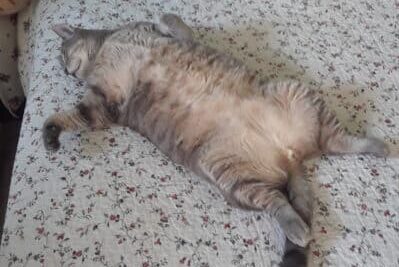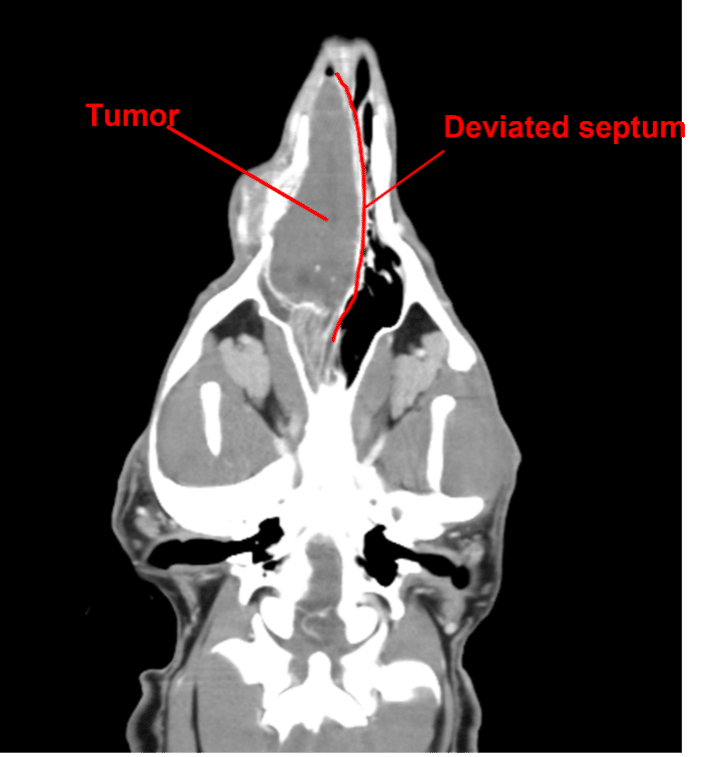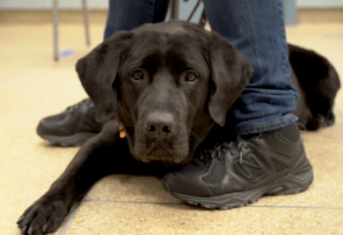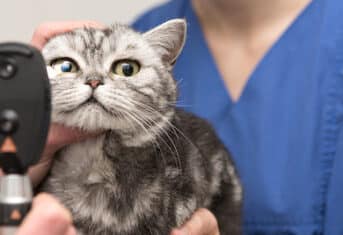Should I Be Concerned About Snoring in My Dog or Cat?

Should I Be Concerned About Snoring in My Dog or Cat?
Our pets endear themselves to us when they exhibit human-like qualities – affectionate licks and “kisses,” a cuddle when we are low and an exuberant greeting when we return home. Snoring is another human-like trait that sometimes occurs in pets. But snoring is often a sign of an underlying health problem, so should pet families consider snoring an endearing quality or a health concern?
What Causes Snoring?
In people and pets, snoring is the vibration of structures in the back of the throat as air passes on its way to and from the lungs. These structures include the tongue, tonsils, lymph nodes, larynx, soft palate and special little pouches in the larynx of dogs and cats called laryngeal saccules. Abnormalities in any of these structures can lead to snoring.
Causes of Snoring in Cats
A common cause of snoring in young cats is a nasopharyngeal polyp. Polyps are benign, stalk like masses that grow down the ear canal and into the back of the throat. They cause snoring sounds even when cats are awake. You can see what a polyp looks like in a prior blogpost.
A less common cause of snoring in cats is nasopharyngeal stenosis, a condition where the back of the throat becomes narrow as the result of injury, infection or prior surgery. When air passes through the narrowed throat, snoring occurs. Cats with nasopharyngeal stenosis may also breathe through their mouth or have nasal discharge. At AMC, our Interventional Radiology Team corrects nasopharyngeal stenosis using balloon dilation and stents.
Causes of Snoring in Dogs
For brachycephalic, or “snub nosed,” dog and cats breeds (think Pugs, French Bulldogs, Persians, and Himalayans), brachycephalic obstructive airway syndrome (BOAS) often causes snoring. At AMC we don’t see many cats with brachycephalic obstructive airway syndrome because our feline population lacks cats of the Persian, Himalayan, Burmese, British Shorthair and Exotic Shorthair breeds. However, we see plenty of brachycephalic dogs since our number one purebred canine patient is the French Bulldog. I have written about this syndrome before. You can also watch a new video about the diagnosis and management of BOAS featuring my AMC colleague Dr. Dan Spector, Specialist in Surgery.
Laryngeal paralysis is another cause of snoring in dogs. Laryngeal paralysis is a disorder that predominantly affects large breed dogs. Just like other causes of snoring, laryngeal paralysis narrows the passageway into the windpipe so that, when a dog with laryngeal paralysis breathes, they make a big, honking racket. Dogs with laryngeal paralysis tend to make more respiratory noise when inhaling and exercising.
An interesting side note on brachycephalic obstructive airway syndrome: it’s used as a model for studying sleep apnea in humans. Sleep apnea in dogs is often associated with brachycephalic obstructive airway syndrome, and, in a Pug described in a recent publication, their sleep apnea produced a high-pitched snore.
Causes of Snoring in Both Dogs and Cats

A couple of causes of snoring can occur in either dogs or cats. First is a tumor in the nose. The CT scan image accompanying this blogpost shows a dog’s nose from above. The CT shows a large tumor in the left nasal passage, deviating the nasal septum to the right. As a veterinarian, the dog’s snoring was a clear hint to look at the nasal passages.
Enlarged lymph nodes in the back of the throat can also cause snoring in both dogs and cats by blocking normal airflow. Enlarged lymph nodes occur with various infections and with cancer.
If you have gotten this far in reading my blogpost, I suspect you know the answer to the question I posed in the title – no, snoring is not normal in dogs and cats and should be investigated by your veterinarian.































